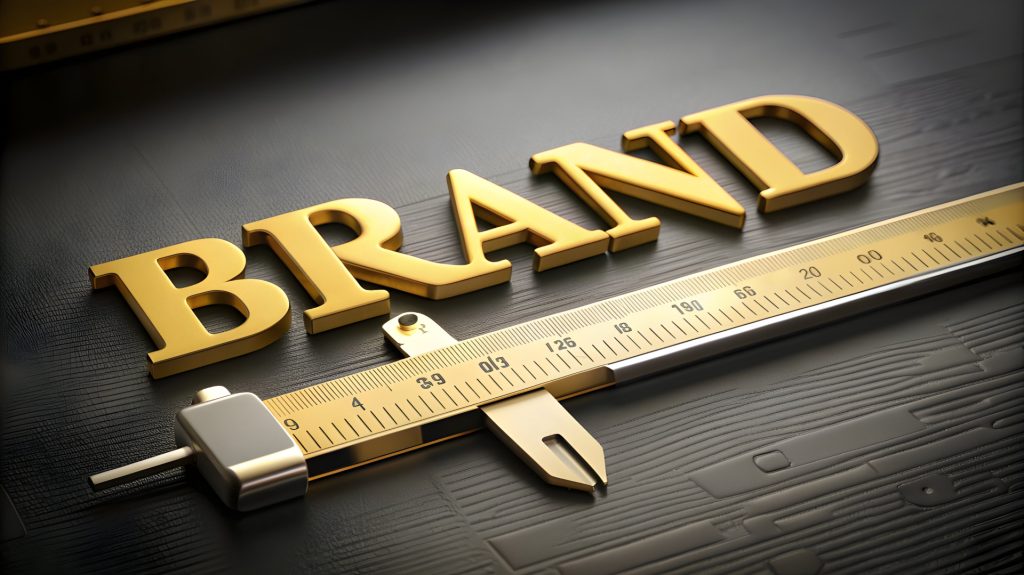What is Brand Authority?

Brand Authority™ is a proprietary score that measures the overall strength and influence of a brand, ranging from 1 to 100. It quantifies how well-recognized a brand is, taking into account factors like branded searches and online reputation. This metric translates a brand’s visibility and relevance into actionable data, helping businesses understand how they are perceived by both users and search engines.
Why Does Brand Authority Matter?
Brand Authority plays a crucial role in how search engines rank websites. Well-known brands often enjoy higher rankings because search engines aim to match user intent with recognizable entities. For instance, when someone searches for “Apple,” search engines prioritize Apple, Inc. over other possible interpretations like the fruit or an album named “Apple.” This happens because brands are seen as trusted entities, and even if their websites aren’t perfectly optimized, their reputation helps them rank better.
Google rewards recognized brands through features like sitelinks, Knowledge Graph entries, and rich results, all of which boost visibility and drive more traffic.
How Brands Influence Traffic, Click-Through Rates (CTR), and SERP Features
Search results have evolved significantly over the past decade, with search engines increasingly adding SERP (Search Engine Results Page) features that enhance brand visibility. For example, searching for “Apple” not only returns the top organic result but also shows expanded sitelinks, recent news, and a Knowledge Graph panel about the company.
These features significantly impact user behavior. When sitelinks appear in search results, they can drive up to 80% of clicks for the top position, leaving only a small percentage for lower-ranking results. This proves that search engines recognize when users are searching for a specific brand and adjust the results to meet that intent, making Brand Authority a key factor in SEO performance.
How is Brand Authority Calculated?
Calculating Brand Authority involves evaluating a brand’s presence and popularity in both branded and non-branded searches. While searches like “Apple” or “Apple Store” are easy to recognize, related terms like “MacBook Pro” or “iPad Mini” also indicate brand strength, even if they don’t explicitly mention the brand name (developped by Moz). This combination of branded and product-specific searches forms the foundation for determining Brand Authority.
The score operates on a non-linear scale, meaning that an increase from 80 to 90 reflects a much greater leap in brand strength than an increase from 10 to 20. This metric primarily focuses on U.S. data but provides a clear snapshot of how a brand is perceived online.
How Can You Leverage Brand Authority?
- Brand Strength and Gap Analysis
Brand Authority can help businesses identify where they stand in terms of brand recognition and where they can improve. If you’re struggling to see results from SEO efforts despite optimizing your site, it might indicate the need for stronger brand-building initiatives. On the flip side, if your brand is well-known but your online presence is lacking, investing in SEO and digital marketing can help bridge that gap. - Evaluating Brand Potential
Brand Authority is also valuable for evaluating potential partnerships, mergers, or acquisitions. A company with strong brand recognition but weak online performance may represent a growth opportunity, while a company with good rankings but low brand awareness could struggle with broader marketing efforts. - Measuring the Impact of Digital PR
In digital PR, the impact of mentions and brand awareness can be as important as securing high-authority backlinks. Brand Authority allows you to track the success of PR campaigns by measuring how effectively your brand resonates across the web, showcasing the influence of your outreach.
Brand Authority vs. Domain Authority: How Do They Work Together?
While Domain Authority (DA) measures the strength of a website’s ability to rank based on SEO factors like backlinks, Brand Authority (BA) focuses on how recognizable and influential a brand is. These two metrics complement each other and provide a more complete view of a brand’s overall power.
- High Domain Authority, Low Brand Authority: This might represent a successful e-commerce site that ranks well but lacks widespread brand recognition outside of the digital space.
- Low Domain Authority, High Brand Authority: This could be a well-established brick-and-mortar business with significant real-world influence but a weak online presence.
By understanding both DA and BA, marketers can identify gaps in their strategy, whether they need to strengthen SEO efforts or boost brand awareness.
How Can I Check My Brand Authority?
You can check your Brand Authority using tools that offer insights into brand strength. Additionally, some platforms provide rankings of top brands, allowing you to benchmark your brand against competitors and assess areas for growth.
How Can I Increase My Brand Authority?
To increase your Brand Authority, you need to get more people talking about your brand. This means generating interest and demand, whether through strong product offerings, excellent service, or engaging marketing campaigns. When more people search for your brand and related products, search engines recognize your brand’s relevance and reward you with higher visibility.
Your brand extends beyond just your company’s name—it includes your products, services, and sub-brands. Building awareness for each of these elements is essential. For example, AMD’s branding of its processors (e.g., Ryzen, Radeon) shows how well-recognized product names can significantly boost a company’s overall Brand Authority.
Ultimately, improving Brand Authority helps ensure that your brand remains visible, relevant, and competitive in both the real world and digital space.
Why Should SEOs Measure Brand Authority?

Measuring Brand Authority is essential for understanding a brand’s overall influence and potential in the market. It helps SEOs and marketers gauge brand health and determine where to focus their efforts for maximum impact. By balancing both Brand Authority and Domain Authority, businesses can build a more effective, long-term strategy that drives visibility, engagement, and growth.
FAQs
1. What is Brand Authority?
Brand Authority™ is a score (ranging from 1 to 100) that measures the overall influence and recognition of a brand online. It evaluates how well-known a brand is, based on factors like search volume and product awareness.
2. Why is Brand Authority important for SEO?
Brand Authority is important for SEO because search engines prioritize well-known brands in search results. A strong Brand Authority increases your chances of ranking higher, appearing in SERP features, and achieving better click-through rates.
3. How is Brand Authority different from Domain Authority?
Domain Authority measures a website’s ability to rank based on SEO factors like backlinks, while Brand Authority evaluates the overall strength of a brand, including its recognition and demand in search queries.
4. How can I improve my Brand Authority score?
You can improve your Brand Authority by increasing brand awareness through content marketing, social media engagement, and effective digital PR campaigns. The more people search for and talk about your brand, the higher your Brand Authority will grow.
5. Does Brand Authority directly affect search rankings?
Brand Authority is not a direct ranking factor, but it influences signals like branded search volume and user trust, which can indirectly boost search rankings.
6. How can I check my Brand Authority score?
You can check your Brand Authority score using tools that provide brand insights, helping you benchmark your brand’s strength and identify opportunities for growth.
